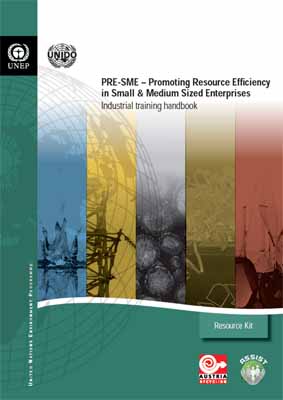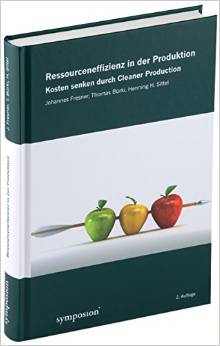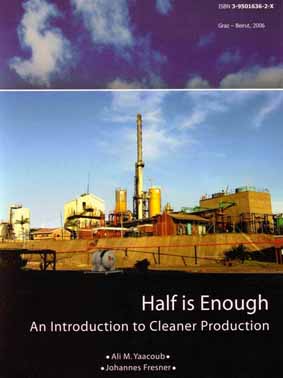Books and Publications
Publications
Brauneis, L., Halbwachs., G., Gebert, A., Fresner, J. (2017): Systematische Optimierung der Vorbehandlungslinie einer Feuerverzinkungsanlage, Handbuch Oberflächentechnik, Band 73, 51 – 55
Dobes V., Fresner J., Krenn C., Ružicka P., Rinaldi C., Cortesi S., Chiavetta C., Zilahy G., Kochanski M., Grevenstette P., de Graaf D., Dorer C. (2017): Analysis and exploitation of resource efficiency potentials in industrial small and medium-size enterprises – Experiences with the EDIT Value Tool in Central Europe, Journal of Cleaner Production 2017.
Fresner J, Krenn C. (2014): Energieoptimierung von zwei Oberflächentechnikbetrieben, Buchbeitrag in Jahrbuch der Oberflächentechnik Band 70, Eugen G. Leuze Verlag 2014
Fresner J., Krenn C. (2017): Theoretical minimum consumption calculation as starting point for cleaner production option identification as a new approach to benchmarking. Journal of Cleaner Production, November 2017
Fresner J., Morea, F., Krenn C., Uson, J.A., Tomasi, F. (2016): Energy efficiency in small and medium enterprises: Lessons learned form 280 energy audits across Europe. Journal of Cleaner Production, November 2016
Fresner, J., Engelhard, G. (2004): Experiences with integrated management systems for two small companies in Austria, Journal of Cleaner Production 12, 2004, 623-631
Fresner, J., et al. (2007): Practical experiences with reducing industrial use of water and chemicals in the galvanizing industry, in Gjalt Huppes, Quantified Eco-Efficiency, Springer, 2007, ISBN 1-4020-5398-3
Fresner, J., et al. (2006): Practical experiences with the implementation of the concept of zero emissions in the surface treatment industry in Austria, Journal of Cleaner Production, October 2006
Fresner, J., Jantschgi, J., Birkel, S., Bärnthaler, J., Krenn, C., (2010): The theory of inventive problem solving (TRIZ) as option generation tool within cleaner production projects, Journal of Cleaner Production 18, 2010 128 – 136
Fresner, J., Jantschgi, J. (2006): Triz to improve energy efficiency and material efficiency of industrial processes, 19th ETRIA conference, Kortrijk, October 2006
Fresner, J., Krenn, C., (2018): Theoretical minimum consumption calculation as starting point for cleaner production option identification as a new approach to benchmarking, Journal of Cleaner Production 172, 2018, pp. 1946 – 1956
Fresner, J., Schnitzer H. (1996): How coffee-making can help one understand cleaner production, J. Cleaner Prod. Vol. 4, No. 3-4, pp. 213-217, 1996
Fresner, J., Wallner, H. P. (1996): Ökofit-II Biogas, Vorbereitungs- und Koordinierungsarbeiten für eine Gemeinschafts-Biogasanlage in der Region Feldbach, Ökologische Betriebsberatung Steiermark, 1996
Fresner, J., Wolf, P., Galli, M. (2000): Effective environmental management by cleaner production: Experiences from Austria and Hungary, Workshop “Efficiency through management of ressources: Green Productivitityprogrammes in SMEs” EXPO 2000 Hannover, September 2000
Fresner, J. (1994): Avoiding Wastes and emissions in Industry: experiences from Austria”, Journal of Cleaner Production 1994, Volume 2, Number 1
Fresner, J. (1998): Cleaner Production as a means for effective environmental management, J. Cleaner Prod. Vol. 6, pp. 171-179, 1998
Fresner, J. (1996): Das Wie zu weniger Energie, Energiesparen mit PREPARE – vorsorgender Umweltschutz bei Kufner, HLK Heizung Lüftung Klimatechnik 1/96, pp 28-29
Fresner, J. (1996): Effizienzsteigerung im Betrieb, Abfallvermeidung mit System bei der Textilherstellung, technikreport 6/96, p IV
Fresner, J. (2006): Galvanik ohne Abfall – ein unerreichbarer Wunschtraum?, Galvanotechnik, 7/2006, 1644 pp
Fresner, J. (1998): Options, measures, results: Ecoprofit-Styria-Prepare two years after project end, J. Cleaner Prod. Vol. 6, pp. 237-245, 1998
Fresner, J. (2004): Reinigung durch feinste Poren, in:steiermarkinnovation 2004, Leykam, Graz, ISBN 3-7011-7471-7
Fresner, J. (2010): Ressourceneffizienz durch Produktionsoptimierung, Zeitschrift für wirtschaftlichen Fabrikbetrieb, Jahrgang 105 (2010) 6, pp 547
Fresner, J. (1996): Saubere Kabel, Pengg reduziert die Abfallmenge um 50 %, technikreport 10/96, p IV
Fresner, J. (2000): Setting up effective environmental management systems based on the concept of cleaner production: Cases from small and medium sized enterprises, in R. Hillary: „ISO 14001 Case Studies and Practical Experiences“, October 2000, ISBN 1 874719276
Fresner, J. (1998): Starting continuous improvement with a cleaner production assessment in an Austrian textile mill, J. Cleaner Prod. Vol. 6, pp. 85-91, 1998
Fresner, J. (2009): Vorsorgender Umweltschutz in der Oberflächentechnik, pp 346 – 353, Jahrbuch Oberflächentechnik, Band 65, 2009, Leuze Verlag, ISBN 978-3-87480-253-6
Gundlach, C., Fresner, J., Jantschgi, J., Nähler, H., (2010): Strategische Innovationsplanung mit TRIZ, in: Gundlach, C., Glanz, A., Gutsche, J. (Hrsg.), Die frühe Innovationsphase. Methoden und Strategien für die Vorentwicklung, Symposion Publishing, 2010, ISBN 978-3-939707-50-9
Krenn C., Fresner J., Bürki T., Wastl H. (2009): Ökoeffizienz durch Abwärmenutzung in der stahlverarbeitenden Industrie, Energieeffizienzsteigerung und Reduktion der CO2- Emissionen durch Einsatz von ORC-Anlagen und Wärmepumpen am Beispiel des Nahtlosrohrwalzwerks der voestalpine Tubulars GmbH & Co KG, Buchbeitrag in Sustainability Management for Industries, Hrg. Baumgartner, Biedermann, Zwainz, Rainer Hampp Verlag, 2009
Krenn C., Fresner J., Meixner E. (2008). Energieeffizienzsteigerung in Unternehmen der stahlverarbeitenden Industrie durch Abwärmenutzung im Niedertemperaturbereich: Institut für Elektrizitätswirtschaft und Energieinnovation, EnInnov08, S. 254, Graz, Austria
Krenn C., Weichbold T., Korp G., Meixner E., Stockner H., Berger D., Bernreiter J., Bleicher F., Geiger G., Fresner J. (2015): Qualitative and quantitative modelling to build a conceptual framework to identify energy saving options: case study of a wire producing company, Journal of Cleaner Production, March 2015
Krenn, C., Fresner, J., Bürki, T., Wastl, H. (2009): Ökoeffizienz durch Abwärmenutzung in der stahlverarbeitenden Industrie, in: Baumgartner, Biedermann, Zwainz (Editors), Öko-Effizienz – Konzepte, Anwendungen und Best Practises, Rainer Hampp Verlag, 2009, ISBN 978-3- 86618-329-2
Wallner, H. P., Fresner, J. (1995): “Industrial Networks at the Regional Level – Creating Islands of Sustainability – Theory and Practice”, presented at: The Greening of Industry Conference, Toronto, Canada, November 1995
Books
PRE-SME - Promoting Resource Efficiency in Small and Medium Sized Enterprises
This manual was developed for United Nations Industrial Development Organization (UNIDO) and United Nations Environment Program (UNEP) to help national cleaner production center (NCPC) to design workshops and trainings, and plan resource efficiency projects. It includes practical tools for working with companies and covers the following topics:
-
Basic Concepts:
Resource Efficiency, Life Cycle Concept, Dematerialization, Decarburization, PDCA Cycle (Plan-Do- Check-Act), benchmarking, Cleaner Production, Safer Production, Chemical Management, Integrated Management Systems - The PDCA cycle as a basis for continuous improvement
- 5 thematic modules for detailed assessments (water, energy, materials, waste, chemicals)
- Resource efficiency benchmarks for different sectors and units
- Relevant international laws, restrictions and standards
- Planning guide for resource efficiency programs
- Appendices: Presentation slides for trainers, workshop exercises, work sheets, and web resources

Resource Efficiency in Production - Lowering environmental costs by the application of Cleaner Production
The book (second edition) is available <a href=“https://www.amazon.de/Ressourceneffizienz-Produktion-Kosten-Cleaner-Production/dp/386329629X/ref=sr_1_fkmr0_1?ie=UTF8&qid=1455839834&sr=8-1-fkmr0&keywords=johannes+fresner+resourceneffizienz” target=“_blank”>hier</a>
Does environmental protection save money? This is possible by decreasing the energy demand, the volume of waste water and waste at the source. Costs can be significantly reduced by using a combination of mass and energy balancing approaches, team-based approach and precautionary environmental principles. In addition, the expenditures for raw materials and supplies and energy sources are reduced.
The author Dr. Johannes Fresner has worked
with more than 200 companies worldwide and has implemented programs to increase the efficiency of energy, water and resources. In this book he shares his wide experience, together with Thomas Bürki and Henning Sittel.
Cleaner Production shows how companies:
- Increase their resource efficiency
- Implement environmental programs under ISO 14001
- Save money with environmental protection
- Reduction of the input materials and less waste production
Fresner, J.; Bürki, Th.; Sittel, H.: “Ressourceneffizienz in der Produktion – Kosten senken durch Cleaner Production”, deutsch, 268 Seiten inkl. Arbeitsblättern und Arbeitsbehelfen, ISBN 978-3-939707-48-6

Half is Enough - An Introduction to Cleaner Production
“Half is enough” provides a focused introduction to Cleaner Production. Cleaner Production is a precautionary and company-specific approach with the aim of minimizing emissions, waste, water and energy consumption.
The applied strategies include: good housekeeping measures, improvement of technologies, chemical management, recycling, etc. Application guarantees a reduction in waste, emissions, and economic costs.
“Half is enough” explains the principles of Cleaner Production and demonstrates show these measures are applied. It describes a variety of practical tips and case studies from companies. Also, it includes worksheets and checklists for direct application.
Yacooub, A. & Fresner, J., Beirut/Graz, LCPC Press, Englisch, 204 Seiten, 21 Abbildungen, 34 Tabellen, ISBN-3-9501636-2-X


- +43 (0)316 367156 - 0
- office@stenum.at
-
Anton-Kleinoscheg-Straße 21, 8051 Graz
Austria
